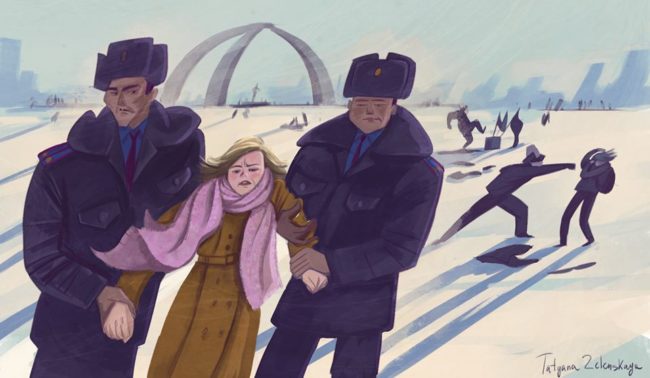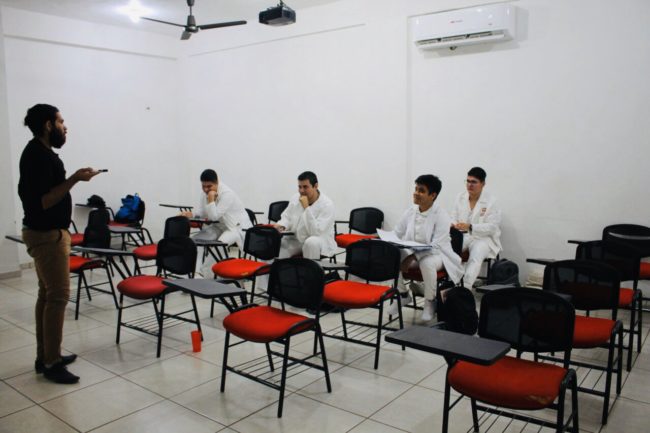More and more people stop giving women flowers and wish them “female happiness” on International Women’s Day, but instead organize talks and discussions about what really worries women and the problems they have to fight against on a daily basis, as well as call for gender equality. Although the state authorities officially support the principles of non-discrimination and respect for women’s rights, in reality they are not ready for dialogue, even on March 8, the only day of the year when everything is supposedly done for women. Peaceful marches and public feminist talks are suppressed by authorities throughout the world. Unfortunately, the countries of Eastern Europe and Central Asia are no exception.

On March 8, 2020, about 50 masked men in traditional Kyrgyz hats, ak-kalpaks, attacked a women’s solidarity march in Bishkek. Police officers arrived, but instead of arresting the attackers, they detained about 60-70 participants of the march. The latter, once they had been taken to the police station, were informed by the police department that the purpose of their detention was to ensure their own safety, and the street action was actually not authorized. As a result of that, the march was foiled and some of its participants were fined for disobeying police orders. Participants of the women’s marches in Bishkek have been facing opposition from the authorities for several years now, and this year a public event in defense of women’s rights did not take place in the Osh region either: according to the organizers, it didn’t happen because of threats coming from police officers.
Activists wanted to draw public attention to the problem of domestic violence, which is not recognized by either the Kyrgyz state or the society. You can hear Kyrgyz MPs stating that women themselves are to blame for the fact that men beat them up (as was the case with MP Kamchybek Zholdoshbaev, for example). Meanwhile, according to statistics for recent years, in Kyrgyzstan more than 6 thousand women suffer from domestic violence every year. Of the approximately 300 criminal cases of domestic violence investigated in 2018, only 4 murder charges reached the court. In the first week of January 2020, two women died at the hands of their husbands, and in both cases these women were subjected to regular violence during their lifetime.
In Baku this year, the march against feminicide, domestic violence, selective abortion, early and forced marriages under the slogan “March 8 – the streets are free for us” was foiled. At the beginning, the authorities did not authorize the street action, suggesting it be held far from the city, and on March 8 the march was interrupted by law enforcement officers: they insulted, beat and detained some protesters, continued to use force even after the march ended, and then drove the protesters into a metro station. The organizers of the march were even followed to their houses. Provocateurs threw food at the rally participants. Later, the Interior Ministry announced this was the dispersal of an illegal street action.
The state statistics of Azerbaijan, which often provides very underestimated data, indicated 600 cases of domestic violence annually; 85% of the victims were women.
Although the feminist march in Almaty this year went through without violence, police officers in uniforms and in civilian clothes tried to prevent it. Kazakhstani activists called to stop the release of rapists on parole, to enact a law against sexual harassment and criminalize domestic violence. Following the street procession, two organizers were brought to administrative responsibility and fined.
According to the United Nations’ data, more than 400 women die from femicide every year in Kazakhstan. Between 2015 and 2018, the number of complaints of domestic violence doubled. In their report of the UN CEDAW Kazakhstan authorities reported a decrease in cases of domestic violence. But we should not forget that often the victims do not report domestic violence, do not seek medical assistance and do not dare to bring the perpetrator to justice.
Recently, Kyrgyzstan, Azerbaijan, and Kazakhstan reported to international experts on the high level of respect for women’s rights in these countries. According to the Azerbaijani authorities, women are actively involved in public and political life. It was only in June 2019, that the country’s authorities reported to the United Nations about the benefits of the training “Violence against women – a human rights violation”. But when in March 2020 women took to the streets to speak out about this problem publicly, they were subjected to pressure and violence by law enforcement officers. This illustrates the real situation of women in Azerbaijan and their access to participation in public life.
Demands to stop violence against women were voiced on March 8, 2020 in many countries of the world. Unfortunately, in a substantial number of countries the authorities were not ready not only to adopt real measures to protect women against domestic violence and feminicide, but even simply to give them the right to speak publicly about their problems. Many demonstrations were suppressed by the police; in some countries, the state did not want to protect activists from attacks. In Pakistan, marches have taken place despite the threats, but some of the participants were stoned. The authorities of Istanbul, same as last year, banned the march, and when it started regardless, they resorted to tear gas. In Paris, police used tear gas against women who demanded anti-racist feminism.
Activists in various countries, including Spain, Chile, Indonesia, and Thailand, drew attention to the problem of inequality in the work sphere and harassment in the workplace.
In Mexico, activists declared March 9 “A Day Without Us” in order to draw attention to the issue of domestic violence and feminicide. Officially, about 570,000 women did not show up at work this day. On this day, there were three times fewer passengers in public transport, and the majority of transportation workers joined the feminist rally. There were practically no women in stores, schools and universities. About half of the parliamentary deputies, the majority of judges and employees of state institutions remained at home. Some companies supported the initiative and gave workers a day off, but because of the need to provide for their families, many women could not join the protest. The Industrial Association of Nuevo Leon reported that the economic losses of this state alone exceeded $27.7 million. The problems that Mexican activists were trying to draw attention to were far from made up: in January 2020, more than 4,500 cases of gender-based violence were recorded in Mexico, while more than 320 women were murdered. Last year’s statistics of approximately 10 murders occurring daily continue to be true this year. In February 2020, a 46-year-old man brutally stabbed his 25-year-old female partner, skinned her and cut out her internal organs. Due to corruption and impunity, most violent crimes against women are left uninvestigated. Large-scale actions, such as the one in Mexico, affecting not just some particular sphere or group, but bringing actual large-scale and sensitive losses, creating difficulties for the functioning of institutions are a desperate way of protest, impossible to ignore.

“When we scream and we are on fire, we aren’t heard! We’ll see how you live without us for a whole day”, feminists say.
Although there is more discussion about the problem of domestic violence and feminicide in recent years, the changes are unfortunately very slow and minor so far. In order for this struggle to succeed, the efforts of feminists alone are not enough: decisive action by the authorities is also needed to protect women. This task is also urgent for Russia. In July 2019, the European Court of Human Rights in the “Volodina v. Russia” case found the country guilty of reluctance “to acknowledge the seriousness and extent of domestic violence and its discriminatory effect on women”.
Drawing by artist Tatyana Zelenskaya, depicting her detention on March 8, 2020 in Bishkek.









 Feedback
Feedback